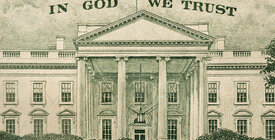Daniel Weiner, director of the Brennan Center’s Elections and Government Program, breaks down the evolving state of money in politics and the reforms needed to make our democracy more inclusive and functional.
Big money in campaigns has always been with us. Why should we worry about it now?
American campaign finance has been transformed since 2010, the year the Supreme Court swept away more than a century of law in the Citizens United decision. Together with other court rulings and aided by legislative gridlock and regulatory paralysis, that decision largely deregulated campaign money. A small handful of very wealthy donors now wield much more power than before. And this new reality has become so ubiquitous that it is easy to lose sight of it.
What are some of the most significant trends shaping campaign finance right now?
Giving by small donors has increased, which is good. But it is misleading too. Giving by big donors has grown even more. In the 2022 midterms, the top 100 donors to federal races together spent more than $1.2 billion, mostly through super PACs. That’s roughly 60 percent more than the total amount from the millions of Americans who gave small donations. This is a sharp reversal from 2010, the year Citizens United was decided, when small donors overwhelmingly outspent the 100 largest donors. In some key races, a handful of billionaires are able to essentially sponsor candidates like prize racehorses.
In addition, there’s an overall trend toward nationalization of campaign fundraising for both congressional and state offices. The surge in big money coming from a few centers of wealth, combined with the emergence of online fundraising via social media and platforms like ActBlue and WinRed, has increasingly made it possible for candidates in marquee races or who have national profiles to rely on partisans from across the country to fund their campaigns. In 1998, House candidates overall raised more than 80 percent of their campaign money from their home states; in 2022, that percentage was down to just over 60 percent — not counting nationalized super PAC spending. Thanks in part to super PACs and other outside groups, there are many marquee races where the vast majority of money spent comes from out of state. The push to appeal to a more partisan national donor base can incentivize some candidates to take extreme positions or engage in normbreaking behavior to gain notoriety and win a national following.
A third trend is that it is becoming harder to track dark money from groups that keep their donors secret thanks to legal loopholes and lax enforcement of existing rules. One factor is that more and more money is being spent online, where only minimal disclosure is required by law. The spending data, though sparse, suggests that dark money spending continues to break records and is concentrated mostly in the most competitive races.
With so many other problems, why should people care about money in politics?
The public is extraordinarily angry about the role of money in politics. This is a consistent fact uniting Democrats, independents, and Republicans. The system distorts who runs and who can win and what issues they embrace. That obviously creates a risk of corruption. Decades of social science research has also shown that when the priorities of wealthy donors conflict with those of most voters, donor priorities tend to win out, if for no other reason than because elected officials are more exposed to what donors think. Candidates who lack access to significant wealth — including many women, people of color, and LGBT people — face special challenges in raising enough money to compete.
What are the priorities for reform?
It is critically important that democracy reform legislation address the role of money in politics to the same extent that it addresses voting rights and gerrymandering. That is one of the most exciting things about the Freedom to Vote Act, comprehensive legislation that came close to passing in the last Congress and remains a top priority for the Brennan Center. It includes key reforms to boost campaign transparency, tighten rules for super PACs, and improve enforcement — changes supported by an overwhelming majority of voters.
It is also critical to lift up the voices of everyday citizens, ideally in ways that deepen elected officials’ ties to their own constituents. One of the most powerful reforms that would do that is small donor matching, in which small, private contributions are matched with public funds. This policy makes it possible for candidates to raise the money they need to compete without depending on the biggest donors, as we have seen in New York City, which has had a matching system for decades. The version that recently went into effect in New York State, which offers a very high match for in-district donations, is especially appealing because it incentivizes state legislative candidates to raise money primarily from their own voters.







